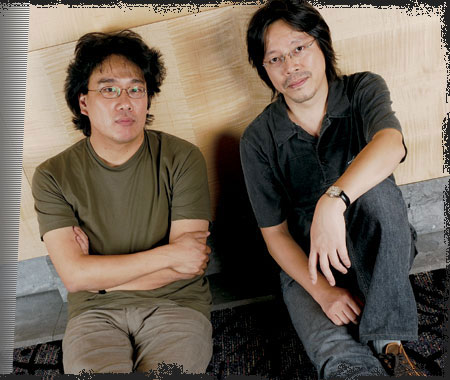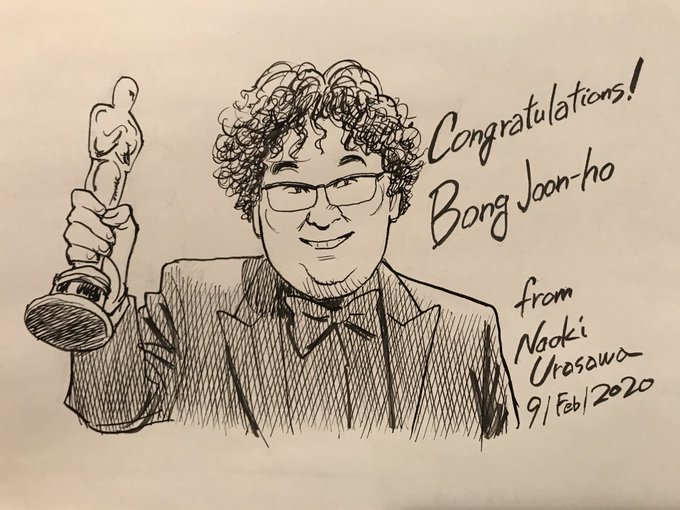When Bong Joon-ho talks to interviewers in Japan, he likes to bring up manga. It stands to reason that he would be a fan of the medium: the storyboards he draws for his films are manga-esque works of art, and he used to draw cartoons for his university newspaper as a student. I’ve combed through some of his interviews in the Japanese media to bring you the highlights of his manga shout-outs. To the surprise of no one, it turns out he is a man of good taste.
Urasawa Naoki
In 2006, Bong went to Japan to promote The Host. At the time, Urasawa Naoki was arguably at the peak of his fame as he neared the end of 20th Century Boys. His work had been published in Korean for years and Bong had long been a fan, so a conversation between the two of them was arranged as part of the PR campaign for The Host.

In the conversation, Bong gushed about his long relationship with Urasawa’s work: while working on the screenplay for his first film (Barking Dogs Don’t Bite) he was reading Urasawa’s Happy!, while working on the screenplay for his second film (Memories of a Murder) he was reading Monster, and while working on the screenplay for The Host he was reading 20th Century Boys. It’s clearly not just flattery: he was able to recount specific scenes, specific shots.
A few years later, an interviewer made reference to Bong having planned on adapting 20th Century Boys, although it’s unclear how far along that plan actually got. (I’ve also seen Bong say that 20th Century Fox asked him if he was interested in adapting Iwaaki Hitoshi’s Parasyte/Kiseijū, as well as that a Japanese studio invited him to direct a remake of Kurosawa’s Low and High — an idea which he immediately turned down.)
In December 2019, Bong and Urasawa were reunited for another conversation, 13 years later. This time it was Bong who was at the peak of his powers, as he was on a global campaign to promote Parasite, at that point an international phenomenon. In the conversation transcript that ran in the Asahi Shinbun, Bong seemed to have kept up with Urasawa’s more recent work (Asadora!, Kushami). The two of them bonded over the fact that they have similar hairstyles and a shared love for Hashimoto Shinobu’s book on his experiences writing screenplays for Kurosawa. Urasawa also drew a couple of tributes to Bong’s success with Parasite (below), and Bong returned the favor by dropping an Urasawa reference in Tokyo during his international post-Oscar victory lap, noting that COVID-19 felt like something out of 20th Century Boys, which featured a killer virus. (April 2021 update: Bong has put out a gushing love letter to help publicize Urasawa’s Asadora!, referring to him as the “greatest storyteller of our time.”)
Furuya Minoru
In 2010 the excellent cultural magazine Eureka put together an entire issue devoted to Bong’s work, and he did a long interview over the phone with them. At one point the interviewer asked him what manga he was into, and Bong mentioned Urasawa again, citing his narrative ability and the way he “shoots” his manga, but he also brought up a couple of names he hadn’t mentioned in previous interviews. One of those names was Furuya Minoru, who he said he likes for his idiosyncratic drawing style and the way he tends to focus on young poor losers, who Furuya draws “with verve but also a sadness to them.” He specifically namechecks Ike! Inachu Ping Pong Club, Boku to Issho, and Himizu. The interviewer also happens to be a fan of Furuya’s work, and he notes that while Bong’s interest in Urusawa was better known in Japan, he sees more Furuya than Urasawa in Bong’s work.
The word that Bong always uses when describing the characters in Furuya’s work is 変態 (hentai), which is generally translated as “pervert.” I don’t know the nuances of whatever the Korean word is that he is actually saying, but in this case he doesn’t seem to be using it the sexual sense of 変態/pervert but rather along the lines of “creep,” “weirdo,” or maybe something like “degenerate.” For example: in a 2014 conversation with film producer Kawamura Genki, Bong said that he would like to meet Furuya, who he admires for his depiction of creeps/weirdos. Himizu came in for particular praise for its “cold dissection of Japanese society (日本社会の断面が非常に冷ややかに描かれている).” (On second thought, Bong’s avowed fascination with “perverts” might not be so idiosyncratic as I’d thought: David Fincher talks about it in a similar way.)
Matsumoto Taiyo
Bong is also, like all good people, a Matsumoto Taiyo fan. In the 2010 Eureka interview mentioned above, he specifically brings up Tekkon Kinkreet, Ping Pong and Number Five. In a 2014 interview he named Matsumoto as a personal fave again, along with Furuya. He mentioned that he’d recently checked out the English version of Sunny at a bookstore while in New York, and that he really liked the Michael Arias adaptation of Tekkon Kinkreet. What Matsumoto and Furuya’s work have in common, he says, is that they both feature “weirdos you feel sorry for.” Years later, when asked in a 2020 interview who in Japan he would most like to meet, he named Matsumoto Taiyo, explaining that they’ve exchanged letters before (!) but never met in person.
Goda Yoshiie
Another manga that Bong has brought up a couple of times is Goda Yoshiie’s Song of Self-Abuse (自虐の詩 Jigyaku no Uta, 1985-90), a critically acclaimed four-panel dark comedy about a violent, emotionally abusive husband and the doting wife who meekly accepts a life of abuse and poverty. (Here’s an example of what it looks like, to give you some idea.) Apparently Bong once told an interviewer that he’d been influenced by the portrayal of poverty in Goda’s work (along with Furuya’s).
Tsuchiya Garon and Minegishi Nobuaki’s Oldboy
And lastly, a favorite piece of film trivia in Japan is that it was a young Bong who introduced Park Chan-wook to the manga that would become his acclaimed film Oldboy (2003). As Park himself told the story while promoting the film’s Japanese release in 2004, he tried to give it a read after Bong pushed it on him, but gave up after having trouble getting a hold of a copy of the then-obscure manga. A year later when he was approached by a producer about turning it into a movie, he remembered Bong’s recommendation and “felt it was destiny.” ■


One more data point on Bong-as-comics-guy: It’s not manga, but apparently Bong took inspiration for Memories of Murder from Alan Moore’s From Hell. https://www.bfi.org.uk/sight-and-sound/interviews/bong-joon-ho-memories-of-murder-2003-korean-cinema-breakthrough
LikeLike